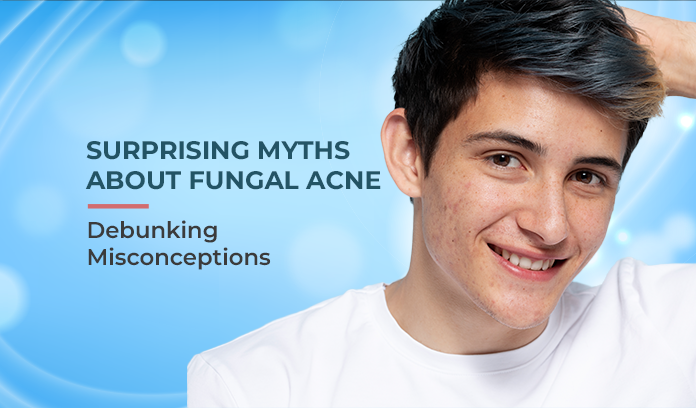Fungal Acne, scientifically known as pityrosporum folliculitis, is a commonly misunderstood skin condition affecting many.
Despite being prevalent, it has many misconceptions surrounding the causes that lead to unnecessary worries or inconclusive treatment options.
In this blog, we will debunk some major myths about fungal acne and underline the truth.
Fungal acne is a result of poor hygiene
Contrary to what many believe, fungal acne is not caused by poor personal hygiene but by an overgrowth of Malassezia yeast on the skin.
Excessive oil production, high humidity levels, and certain medications can contribute to its overgrowth, resulting in fungal acne development.
Fungal acne is regular acne
Despite its name, fungal acne is nothing like acne in the traditional sense. It is not caused by clogged pores or bacterial buildup.
It is caused by inflamed or infected hair follicles, resulting in tiny, cluster-like red bumps on the skin.
Fungal acne is characterized by itchy, small, and tiny bumps that look like acne scars.
It only occurs on the face
Fungal acne can develop anywhere. From the chest and upper arms to the shoulders and the back, these tiny bumps do not exclusively occur on someone’s face.
As these areas have a higher concentration of sebaceous glands, making them more susceptible to Malassezia overgrowth.
Fungal acne is contagious
It is false that fungal acne is contagious and can be transmitted from one person to another.
It is primarily caused by an overgrowth of yeast already present in the skin.
It is wise to remember that those with a compromised immune system or unhealthy skin barriers can be more prone to fungal acne.
Fungal acne can be treated with regular or mild acne products
Standard acne treatments, such as products containing salicylic acid and benzoyl peroxide, are ineffective for fungal acne treatments.
Some of these treatments can potentially disrupt your skin’s natural balance and worsen fungal acne.
For fungal acne, topical or oral antifungal agents are considered to be the most effective treatments.
Conclusion
By debunking these surprising myths about fungal acne development, we can help ensure appropriate treatment strategies.
Remember, knowledge is powerful enough to combat myths and achieve healthy, improved skin.
If you suspect having fungal acne, the best thing to do is seek a dermatologist’s help as they can create an acne treatment plan tailored to your skin type.











